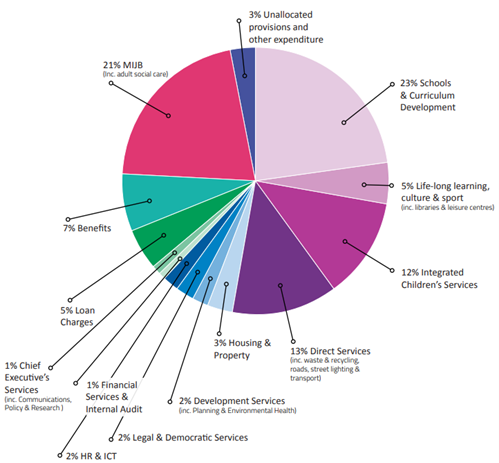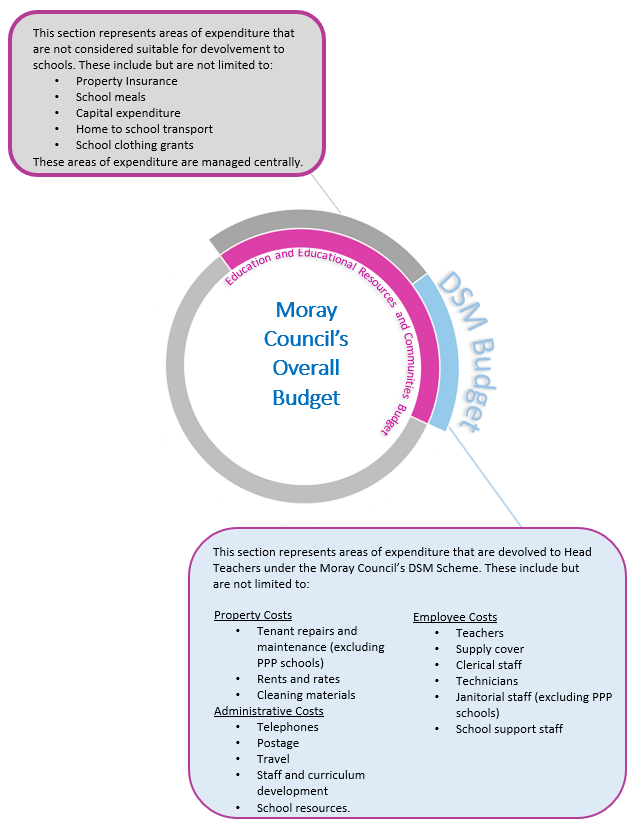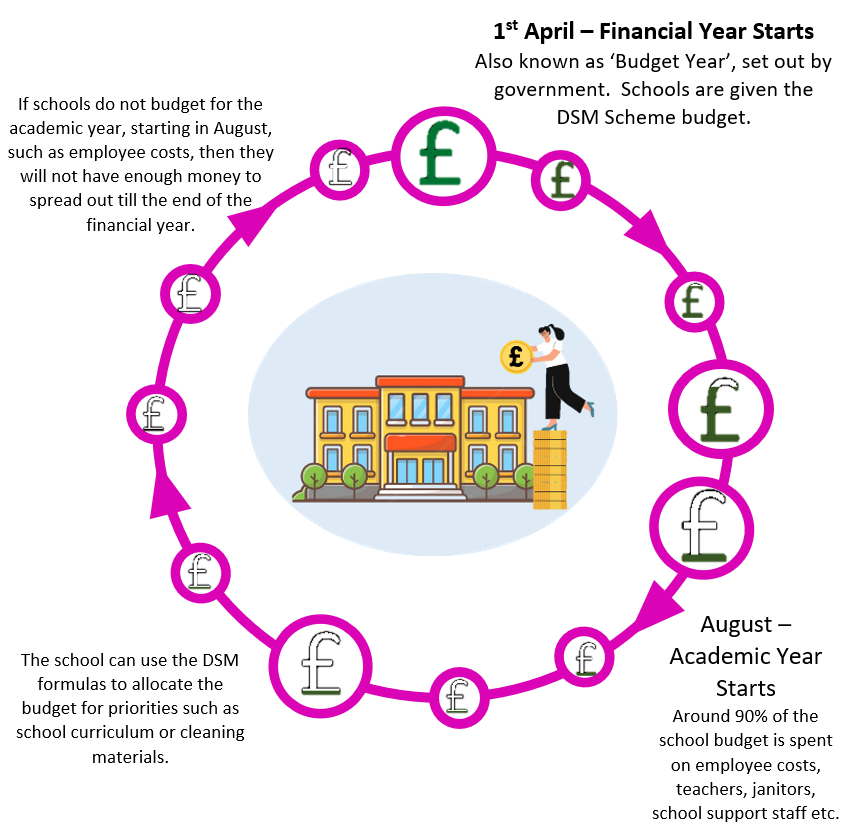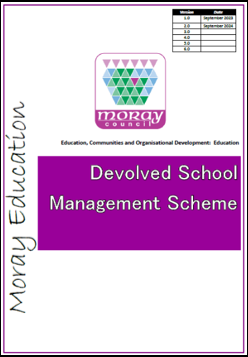Devolved School Management Scheme
What is the Devolved Management Scheme?
Moray Council’s Devolved School Management (DSM) Scheme is a set of guidelines and formulas that determine how much funding a school receives to deliver the very best for Moray’s children and young adults and their families through our 46 primary schools and 8 secondary schools.
The DSM is designed to:
- be fair to all
- provide equal opportunities for all schools to be successful
- be clear and transparent in how financial decisions are made by the school leadership team
- deliver value for money
Why have guidelines changed recently?
The Scottish Government issued updated guidelines in 2019 and asked local authorities to review and update their schemes by August 2022. The new guidelines require Local Authorities DSM Schemes to be easier to understand for everyone in the learning estate and for Head Teachers to listen to the views of pupils, staff, parents and local councillors before making decisions about how they spend their funding to improve the educational opportunities of all children and young people in their schools.
How often is the DSM Scheme reviewed?
The DSM Scheme will be reviewed every 3 years by a ‘working group’ which will include representatives from schools, central education, finance, human resources and trade unions. Every 3 years the DSM Scheme will be reviewed by another Local Authority who may make suggestions for improvement. If there are big changes to the Council budget allocation or policy decisions that impact on the DSM Scheme, it may be necessary to review it sooner that every 3 years.
How is a school budget set, and how often?
Moray Council sets its budget annually, taking effect from April 1st each year. The following table shows how the budget it distributed between the many services provided by the council.

Where does the DSM Scheme budget come from?
The council’s annual budget is broken down into many different sectors, one of which being the Education Service. Using the DSM Scheme guidelines and formulas, the Education Service budget is divided to create individual school budgets. This is based on number of pupils, classes and staff.

What does DSM Scheme funding pay for?
The DSM Scheme provides funding for staff- wages including; taxes and pension contributions, energy costs, and educational supplies and services needed to deliver teaching and learning for pupils. This will include items such as pencils, paper and jotters, text books, calculators, art and craft materials, PE equipment. It also includes funding for running the school (known as overhead costs) for resources such as phones and photocopying machines, soap and paper towels.
Primary and Secondary school budgets have the same guidelines but the way the budgets are used can be different:
- In primary schools the budget is calculated based on the entitlement for a teacher for each class for the full week. This will be more than one teacher cost due to teachers having reduced class contact time. The staffing costs are likely to be greater than 90% of the total school budget allocation. A budget for educational resources is based on the number of pupils at the school. Schools are given a budget that meets the full cost of energy.
- In secondary schools the budget is calculated based on the pupil number and from this budget the school has to pay for both staffing and resources costs. The Head Teacher and senior leadership team decides on the staffing structure required to meet the timetable in place of management needs of the school each year. This can change each year depending on the number of pupils at the school and the subject choices made by pupils. The budget on staffing is likely to be greater than 90% of the total budget allocation. The remainder of the budget after staffing costs have been taken into account to meet the costs of educational resources, for example text books, jotters, paper, photocopying and printing costs, art, science and technology materials and cooking ingredients, and sports equipment. Secondary schools do not pay directly for energy costs or many of the building maintenance and running costs, such as cleaning and janitorial services which are met by a separate contract arrangement that schools do not meet from their budget allocation.
What does the council pay for?
Some costs are not considered suitable to be devolved and are met centrally by the Council’s Education Service. These include services such as school meals, home to school transport, and waste collection.
Specialist education services may be provided via a shared centralised team with particular areas of professional expertise such as Instrumental Music Instructors, Educational Psychologists, and Learning and Behaviour Support Teams. This approach is a more efficient use of such staff than provision to each individual school, as they may only be needed by the school for a few hours a week or less, but across all the schools the hours add up to a full or part-time role.
In addition, some external services like the computer system that manages pupil data are paid for centrally for all schools under one contract, rather than every school having to manage a separate contract. Buying this service on behalf of all schools helps the council to keep the costs of the service lower and getting the Best Value from this resource while making sure every school receives the same level of service.
What is Best Value?
Best Value is the term used to describe the legal duty for Local Authorities, such as Moray Council, to ensure that all public money is used to achieve the best possible outcomes for the public. Best Value is a key principle of the DSM Scheme. In the case of Educational Services and Schools, this means that all funding must be spent in line with council financial and purchasing guidelines to deliver the best education possible for all pupils from the resources available.
How do schools manage their budget throughout the year?
The financial year runs from 1st April to 31st March, but the school academic year runs from August to July. Schools need to consider this when planning their staff recruitment as, for example a contract for a teacher for the full academic year, August to July will be paid for over two different financial years.

What is the role of parent councils in relation to the DSM Scheme?
Under the DSM Scheme, Head Teachers are required to provide Parent Councils with funding information, budget updates, plans and priorities throughout the year, and to discuss how their approach meets their School Improvement Plan objectives. It is the role of the Parent Council to share this information with parents/ carers via Parent Council meeting minutes.



Where can I access the full version of the DSM Scheme?
Moray Council will update and publish their DSM Scheme annually and it will be available to view on the website: Moray Council Education
Head Teachers should also arrange for DSM information to be published on the school website and inform parents and other interested parties when it is available.

